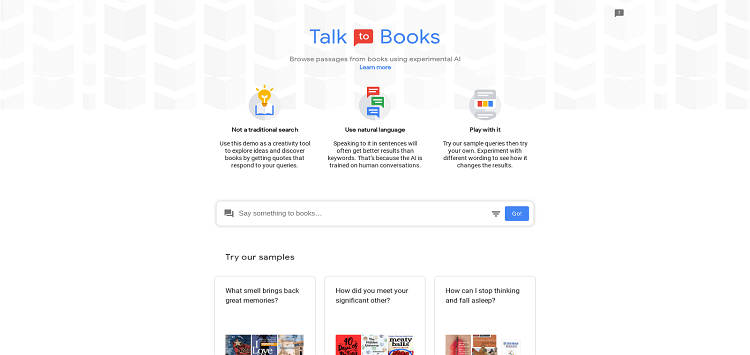Talk to Books AI is like having a friendly book guru right at your fingertips. Imagine asking a question about books, and this clever AI sifts through thousands of books to find the perfect sentences that answer your query. It’s a magical tool that opens up a world of literature in a conversational way.
With Talk to Books AI, book exploration has gone beyond keywords and topics – it’s about having real conversations with the wisdom of countless authors.
Talk to Books AI works its magic by understanding what you ask, just like a friend would. You type in a question or statement, and the AI starts its search, scanning over 100,000 books to uncover sentences that match your query. It’s not about matching keywords; it’s about understanding the essence of what you’re looking for. Whether you’re curious about the best detective in the world or want to explore the cosmos, this AI buddy has your back.
key features of Talk to Books AI:
- Conversational Book Exploration: Engage in natural language conversations to discover books.
- Sentence-Level Search: Search and receive responses at the sentence level, not just by keywords.
- AI-Powered Recommendations: Get personalized book recommendations based on your queries.
- User-Friendly Interface: Enjoy an intuitive interface that welcomes both avid readers and newcomers.
- Vast Book Database: Access a collection of over 100,000 books for exploration.
- No Keyword Dependency: Find relevant content without relying on rigid keyword matching.
- Voice-Enabled Experience: Seamlessly integrate with voice assistants for hands-free exploration.
- Raw Power Display: Experience the AI’s unfiltered capability to demonstrate its potential.
- Open-Source Accessibility: Utilize the underlying code for various creative applications beyond book discovery.
- Enhanced Book Discoverability: Rediscover books in a new conversational light, transcending traditional methods.
- Contextual Responses: Receive sentences that align with your query’s context, enhancing relevance.
- Mobile Compatibility: Access Talk to Books AI on mobile devices for reading suggestions on the move.
- Author-Independent Exploration: Explore books based on content, regardless of authorship or topics.
Use Cases of Talk to Books AI:
- Book Recommendations: Discover new books aligned with your interests by asking questions.
- Research Assistance: Find specific information or quotes from books to support your research.
- Learning Aid: Access relevant content to deepen your understanding of various subjects.
- Topic Exploration: Dive into various topics by asking questions and exploring related book passages.
- Inspiration Source: Use the tool to spark creative ideas and gather insights for writing projects.
- Casual Conversations: Engage in conversational interactions with books, making reading more interactive.
- Educational Supplement: Enhance educational experiences by supplementing classroom learning with curated book excerpts.
- Language Learning: Improve language skills by interacting with books in a natural and immersive way.
- Content Creation: Gather diverse perspectives and information for content creation in various media.
- Expertise Search: Identify experts in a particular field by searching for relevant content from books.
- Novelty Games: Explore word associations and engage in playful learning with the Semantris game.
- Curriculum Enhancement: Enrich educational curricula by integrating relevant book passages into lessons.
- Book Club Discussions: Facilitate engaging discussions by using Talk to Books AI to source quotes and insights from books.
Pros and Cons:
| Pros | Cons |
|---|---|
| 1. Conversational Discovery: Natural language interactions lead to engaging book discoveries. | 1. Limited Context Understanding: Responses may lack nuanced understanding of complex queries. |
| 2. Personalized Recommendations: Tailored book suggestions enhance relevance. | 2. Dependency on Available Content: Gaps in subject coverage may result in less relevant responses. |
| 3. Diverse Book Selection: Access to a vast database broadens exploration. | 3. Lack of Personalized Context: AI may not fully grasp user preferences, leading to varied results. |
| 4. Enhanced Accessibility: Mobile and voice compatibility enables on-the-go exploration. | 4. Subjective Interpretation: Interpretations of context can lead to inconsistent responses. |
| 5. Innovative Exploration: Introduces a novel approach beyond traditional searches. | 5. Absence of Human Touch: Responses lack the personal touch of recommendations from humans. |
Frequently Asked Questions (FAQs):
-
What is Talk to Books AI?
Talk to Books AI is an experimental AI-powered tool developed by Google that allows users to explore books at the sentence level by inputting natural language statements or questions.
-
What is Google Talk to Books?
Google Talk to Books is a revolutionary tool that transforms book discovery by offering conversational responses based on natural language queries, effectively changing the way we interact with literature.
-
What is the use of Talk to Books?
Talk to Books AI fundamentally changes how we find and engage with books, providing a unique and intuitive way to explore ideas and discover new reading material.
-
How does Talk to Books AI work?
Talk to Books AI works by using advanced AI algorithms to understand natural language queries and searching through a vast collection of books to find relevant sentences that provide conversational responses.
-
Can Talk to Books AI suggest specific books to read?
Yes, Talk to Books AI can indirectly suggest specific books by extracting sentences from books that match the user’s query, offering insights into potential reading material.
Overall Final Thoughts
Talk to Books AI stands as a testament to the ever-evolving relationship between technology and literature. With its conversational approach, voice-first integration, and open-source potential, this tool is poised to reshape book exploration for generations to come. It’s not just a tool; it’s a literary companion that guides us through the intricate tapestry of human knowledge and creativity.
#fun tools
